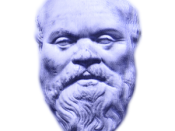Hamlet grapples with his own task in its immediate context. Yet that effort entrains wider frames of reference whose signification critics have striven to clarify. In one such frame, Hamlet's agon reformulates the question, "What is a man?" (4.4.33) which he himself raises.1 As a rational animal, a man is one who thinks. But the play problematizes the proper exercise of thought by which man sustains this identity. The role of reason in Hamlet has attracted considerable critical attention. According to one school, inaugurated by Harry Levin and extended by scholars such as Chris R. Hassel, Walter King, Eve Sanders, William Morse, Kenneth Rothwell, Lars Engle, and Ronald Shafer, Hamlet debunks the Renaissance praise of human reason, epitomized by Pico della Mirandola.2 In contrast, Carole T. Diffey examines the role of "godlike reason" in the play.3 According to another school, ably represented by Lily Bess Campbell, John S. Wilks, and Jennifer Low, the play elaborates the classical doctrine regarding the responsibility of reason to control passion.4
According to a third school, forged by Herschel Baker, A.D. Nuttall, Mark Matheson, and Gordon Hartford, Hamlet foregrounds Stoic doctrines concerning the function of reason in the conduct of life.5
Unlike these preceding critics who have considered the play in terms of its debunking or appropriation of earlier notions of reason, I shall examine how, in Hamlet, the concept of reason, as transmitted by the AristotelianThomist synthesis, is subjected to a radical critique which problematizes the meaning of man as the rational animal. The investigation will involve sequential uncovering of the ways in which the function of reason is questioned and reconstituted in the play. At the core of this analysis is a reinterpretation of the relation between reason and the individual exercising it.
According to Aristotelian-Thomist doctrine, "man is principally the mind of...


